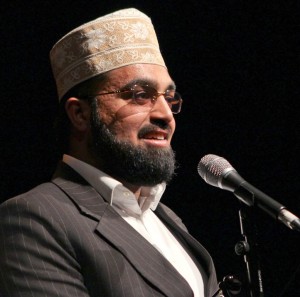
Shaykh Dr Umar Al-Qadri (www.impic.ie): more of his fellow Muslim clerics here in Ireland should be publicly stating their condemnation of radical jihadist sentiment.
Shaykh Dr Umar Al-Qadri of the Islamic Cultural Centre, who has taken a high-profile public stance in relation to radicalisation of Irish Muslims, is disappointed that no-one in State officialdom has taken steps to curb the spread of what he has described as a narrative of hate. And it’s worth noting that this is a concern he has raised repeatedly and vocally in recent years, unlike some other Irish-domiciled Imams, whose consistent public silence is decidedly troubling.
As Dr Al-Qadri told me last week: “I believe that, unfortunately and despite my warnings over the past two or more years, there have been no increased measurements (in Ireland) from either security or deradicalisation perspectives.
“No such measurements have been introduced by the Government and, unfortunately now, we have this case (the London Bridge and Borough Market attacks) that has proven exactly what I said two years ago: that there are people living in Ireland for whom this country is a safe haven, and they are using Ireland to not only spread their cancerous ideology, but also to plan attacks in other parts of the world and, God forbid, such an attack may also occur in Ireland.”
He added: “My concern is that the Gardaí, for example, have very limited resources and they don’t have a single member among their compliment who can speak the languages that are important in this particular field of Islamic extremism; I am referring to different dialects of Arabic, the Urdu language and various other languages. And I feel it is important to have Garda personnel who can speak and understand these languages and therefore can monitor every conversation that is being held.”
That none of his concerns have been taken on board by a force which appears to be caught in some sort of navel gazing procedural black hole should concern Muslims and non-Muslims alike.
On an island which is readily familiar with acts of sectarian brutality, and with our capital city providing a proxy battle field for two feuding gangs who think nothing of publicly assassinating their respective enemies, we need An Garda Síochána to be fully focused on law and order, rather than itself.
And the nagging doubt that ongoing US military landings at Shannon Airport legitimises Ireland as a target from the perspective of jihadis cannot be summarily dismissed as deluded anti-neoliberalism or the sole preserve of the anti-Israeli lobby.
Our own history shows how skewed, toxic ideology can legitimise (for those supporting such causes) the targeting of innocent civilians and to deny someone their life purely based upon their religion. This is ground we know well; far more so, I believe, than most European states for that matter.
Considering previous Garda successes when it comes to tackling subversives, why they don’t appear to have (at least) taken any action of significant scale against those radicals living and preaching hate here is anything but a moot point. That ought to concern us even more so than the notion of a targeting of Shannon.
Dr Al-Qadri continued: “It’s important to understand that Ireland is a very easy target as a safe haven…and it’s important to note that more than two thousand radicals are being monitored by UK law enforcement agencies, and it is very easy for these radicals to travel to Ireland because we don’t have a (hard) border with the North. Now I am not in any way suggesting that we should enforce older style border controls between the North and the Republic but I would suggest that in Belfast, at the airports as well as at the port, there should be enforced passport control. Anyone that comes from mainland UK should be checked and that would be a very important and significant step in terms of giving a signal to these individuals that if you want to travel to Ireland, then you won’t be able to go under the radar anymore.”
Dr Al-Qadri noted that the Gardaí has had some level of interaction with the Irish Muslim community, which he feels is “doing its best to identify any extremist but at the same time, something which I think is missing, that I also highlighted two years ago, is that it is not just about (being vigilant of) those people who are pro-Isis, who are supporting very categorically these extremist militants, but it is also about those people who may not seem violent but express extremist views: that democracy is incompatible with the Islamic way of life, or as a Muslim you can never be at peace unless you have established the Caliphate, or that as a Muslim you cannot have good relations with non-Muslims, all this very distorted opinion which are not part of the Islamic faith, which represent perversions of the Islamic faith – this is the Wahhabi school of thought (which was referenced in last week’s column) which I highlighted that in my (Waterford) lecture…but despite my warnings we still see (such) literature in this country and financial support for those that spread this cancerous ideology…since they are still openly able to propagate these dangerous ideas.”
Dr Al-Qadri has called for the creation of deradicalisation courses across Ireland to challenge the narrative created by the hate peddlers “to ensure that the threat is minimalised, and I feel this is something the Government must seriously look into”.
The Shaykh has once again provided food for thought and a message worth taking on board, both on high and within our local communities, including Ireland’s 75,000 Muslims.

